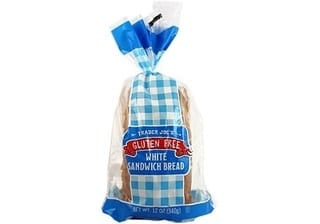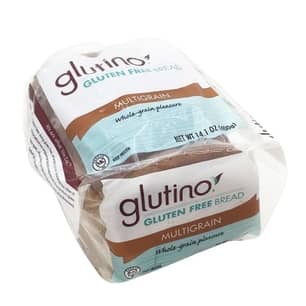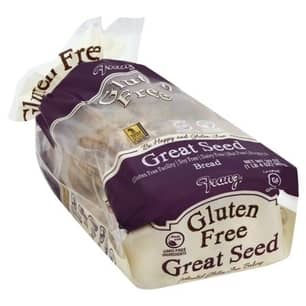The feeling of being bloated after a meal sucks. We’ve all been there. And, unfortunately, certain foods tend to cause this feeling more than others. There is a solution though!
Does bread make you bloated?
Yes, bread can make you bloated, especially bread that’s high in starch and fiber. Starches can be difficult for the stomach to digest which can lead to bloating. Fiber can help with digestion, but only if your body is used to it. A sudden increase in fiber will likely lead to bloating and gas.
There is also evidence which suggests people that have a gluten allergy or Celiac disease are more prone to bloating when eating bread or other foods containing gluten.
So, why does bread make you bloated? And, what can you do to enjoy bread without the bloated belly?
Keep reading…
Why does bread make you bloated?
There are a few main reasons why bread could be making you bloated.
The most common reasons for becoming bloated after eating bread are an intolerance to gluten (or Celiac disease), a sudden increase in fiber, and the over consumption of sodium.
Some of these have relatively easy solutions, while others may take a more creative approach to resolving. I’ll cover each in more detail below.
Gluten intolerance and Celiac disease
You hear it all the time, gluten this, gluten that… but, what is gluten?
Gluten is a type of protein that’s most often found in wheat, rye, and barley. It’s the ingredient that allows bread to rise when cooking giving it that fluffy texture we all know and love.
Unfortunately, some people have an intolerance or allergy to the protein gluten causing bloating, abdominal pain, nausea, and fatigue, among other symptoms.
Celiac disease is the most severe form of this intolerance.
Celiac disease is an autoimmune disorder where the body reacts negatively to gluten. When ingested, the body sees the gluten as a threat and attacks the protein. The side effects of this reaction are what causes the pain, gas, and bloating.
There’s a huge percent of the population that has undiagnosed Celiac disease. If this sounds like you it’s best to speak to your doctor and get tested.
Your doctor will likely administer a blood test, and if that comes back positive, take a tissue sample from your small intestine to check for any damage.
Even if you’re diagnosed with Celiac disease, there are still some bread options which you can enjoy. I list some of the more popular ones below.
Sudden increase in fiber
This is probably one of the more common reasons for experience bloating after eating bread. I’ve actually experienced this myself. And, while it’s not fun, there is a pretty easy solution.
Fiber is a carbohydrate and it’s essential for the body’s digestive system. It actually helps the body digest food, which is why the correlation between more fiber and bloating is so counter-intuitive.
The problem really stems from a lack of fiber, though.
Most Americans don’t eat nearly enough fiber. So, when they consume a bunch of fiber their bodies don’t know how to process it. This ultimately leads to a variety of digestive symptoms including a bloated stomach.
The best way to avoid this adverse reaction is to slowly increase the amount of fiber in your diet. I touch on this more, below…
Too much sodium
Another super common reason for bloating is eating a diet that’s high in sodium (or salt). Sodium, while an important mineral for a functioning body, can cause your body to hold onto (or retain) more water than you’d like.
The more water your body retains the more bloated you’ll feel.
What’s really surprising is bread is actually the top source of Sodium in an American diet! This means by cutting down on the amount of bread you’re eating, or finding a bread lower in Sodium, you should find yourself less bloated.
Another way to combat a diet high in Sodium is by drinking more water. Water will flush out excess sodium ensuring your body retains less water. I touch on this in more detail below.
5 ways to enjoy bread without getting bloated
I understand there are certain things out of our control, like an intolerance to gluten for example. That said, for a majority of us there are some very easy remedies which can help us feel less bloated and enjoy more bread.
Take a look!
1. Eat slower
There are a variety of reasons why you should slow down when eating. Better digestion, weight loss, hydration, and overall satisfaction with your meal all stem from the speed at which you consume your food.
For the purpose of this article, digestion is the most relevant.
Your body’s ability to digest its food plays a big role in how bloated you’ll feel after a meal. And, digestion starts in your mouth with chewing your food.
Amylase is an enzyme which is found in our saliva, it’s the enzyme which is responsible for the breakdown of carbohydrates. By eating too quickly, you’re not allowing the food to mix with that enzyme which often results in bloating and gas.
Additionally, when eating too quickly we’re swallowing more air. The only way for us to rid our stomach of that air is by either burping or passing gas, both of which are uncomfortable.
If you’re feeling bloated on a regular basis, try eating slower. Chances are you’ll notice a big difference.
2. Gradually increase your bread intake
For some of us, especially those who don’t eat bread very often, it might be wise to slowly introduce bread into our diets.
One of the most common reasons for bloating, as mentioned above, is the sudden increase in fiber. Certain kinds of breads, like wheat or rye, are often higher in fiber. If you’re body isn’t used to it, bloating is likely going to be a side effect.
If you don’t eat bread on a regular basis, try having one slice every other day. Then, the following week, try two slices. Increase your bread intake from there…
The most important thing is to listen to your body. If you’re finding you’re bloated after 3 or 4 slices of bread, cut it in half and see how that makes you feel.
3. Try a gluten-free bread
While gluten-free bread isn’t usually as enjoyable, it’s better than not being able to enjoy bread at all! And, especially for those who are gluten intolerant or have Celiac, gluten-free bread might be the only option.
While the science behind a gluten-free diet is limited, it seems as though reducing the amount of gluten in our diet can only be beneficial.
Here are a few of the more popular gluten-free bread options:
Trader Joe’s Gluten-Free White Bread

The gluten-free bread from Trader Joe’s is a great option for those that still want to enjoy white bread but aren’t able to digest gluten. This is probably my favorite gluten-free option.
That said, it’s fairly high in sodium and pretty low in fiber. It’s good to keep that in mind given both of those can cause bloating.
Glutino Gluten-Free Sandwich Bread

What’s cool about Glutino is they offer an entire suite of gluten-free products, everything from cookies and sandwich bread to pretzels and crackers. Definitely worth checking out.
The only thing that I’m not a big fan about is the price for many of their products. They tend to be a little more expensive than other gluten-free options.
The bread, however, is very soft and toasts well.
Franz Gluten-Free Bread

Franz is another brand that makes a pretty solid gluten-free bread. The bread is soft, toasts well, and tastes great!
They offer a few different options that are all gluten-free, including a 7-Grain, Great Seed, and White Bread.
The only hangup for me on this option is it doesn’t seem to be available in very many locations. That said, you can purchase their gluten-free breads online without much hassle.
Give them a shot!
4. Try other types of bread
Certain types of breads, and other carbohydrates, can cause your body to retain more water and give you that feeling of being bloated. This is primarily due to how fast your body digests those carbohydrates.
Simple carbs, like white bread, white rice, and pastries, are digested much quicker by your body. These carbohydrates enter your blood almost instantly which cause a blood sugar spike and can leave you craving more carbs.
More carbs often leads to more bloating…
Additionally, the amount of sodium in the bread you’re eating may be the culprit for your bloated belly. When shopping for bread, look at the nutrition facts, specifically how much sodium it contains.
Try experimenting with the type of bread you’re eating and pay attention to how your body feels after. If white bread is the main type of bread you’re consuming it might be wise to try other, more complex breads like whole wheat or rye.
5. Drink more water
The amount of water you drink during the day can directly impact how much water your body retains. And, the amount of water your body retains can impact how bloated you feel throughout the day.
Here is an easy way to think about water consumption as it relates to bloating.
Drinking only one or two cups of water each day forces your body into a survival-like mode where it holds onto (or retains) a majority of the water you give it to ensure you’re hydrated in the event you don’t come across more water.
This can be easily combated by just drinking more water throughout the day. In doing so, your body knows it will be getting water regularly so it doesn’t need to hold onto nearly as much of it.
This is a great solution to feeling less bloated, from bread or any other foods.
